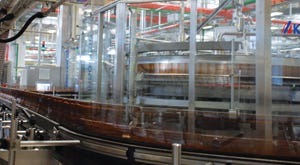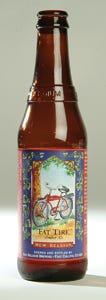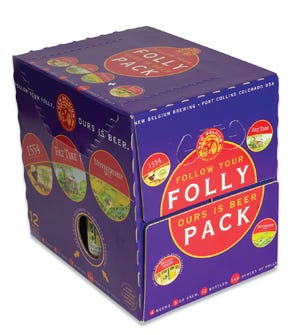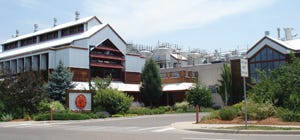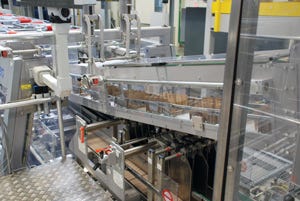Brewery equips to handle Fat Tire
January 30, 2014
|
Bottles travel into the new filling area, a $20 million-plus expansion with many green elements and technologies, such as the filter, above. |
Pedaling his way through Europe on an old fat-tire bicycle, Jeff Lebesch had no idea his life was about to change. After sampling the extraordinary Belgian beers along his path, the Fort Collins, CO, electrical engineer quickly returned to his home and began creating a Belgian-style brew in his basement. Family and friends tested his first two creations, Abbey and Fat Tire, and reveled in the well-balanced tastes.
Lebesch and his wife, Kim Jordan, continued working on the basement operation and opened for commercial business in 1991. Kim handled the marketing and sales and even made deliveries out of the family station wagon. The team overflowed into a second location at a railroad depot, but in 1995, the multiplying crew outgrew this location and built its first brewery from the ground up. Fast-forward to today and New Belgium Brewing has become one of America's top craft brewers, offering a diverse collection of unique beers. It's astonishing that a small basement experiment grew sales to 437,000 barrels last year and the brewer anticipates a 9-percent increase in production this year.
|
|
New Belgium's former packaging room operated two filler lines, one of which handled 300 bottles/min while the other filled 120 half-barrels/hr. With the launch of a new organic beer, Mothership Wit, and the growth of the brewery, New Belgium found it necessary to expand its facilities to keep all the assets working together.
Finding a partnership
In 2006, New Belgium put together all of its basic criteria and building specifications to build a new bottling and packaging hall. A team of brewery representatives, including maintenance, operations and engineering, interviewed suppliers and line integrators. Evaluations were based on after-sales service and the availability of parts and support, level of technology, vendor services, attitudes toward customer satisfaction and training and vendor reputation in the brewing industry. “KHS (www.khs.com) had really good ratings on equipment, technology, innovation, and it had a great reputation in the brewing industry,” states Jim Spencer, New Belgium's engineering director. “Our founders, Jeff and Kim, always believed in innovation, and that's always been one of their core values,” Spencer explains. “KHS is right out there in the forefront of technology.”
KHS supplied technology that's new to the U.S., including a bottle filler, a case packer and a robotic palletizer now featured in New Belgium's new 55,000-sq-ft hall. The $20-million-plus expansion features many green design elements and technologies, such as the KHS filler, which reduces CO2 usage.
Fill 'er up
|
One of the innovative pieces that got New Belgium employees really excited was the electronic filler. KHS has numerous installations in Europe, but this is its first time used in the U.S. for brewing. Like most European breweries, New Belgium preserves the quality of its beer by not pasteurizing. The KHS filler features flow meter and filling valve technology that ensures accurate fill levels and minimizes oxygen levels in the bottle during filling. The lower dissolved oxygen level protects the beer's taste and increases shelf life.
“The filler improves the control of fill heights as well as the amount of CO2 and water consumption,” Spencer says. “It is extremely flexible for product changeovers in terms of varieties and run conditions. We're all very excited about the level of technology and its overall design elements.”
New Belgium's former bottling line operated at 300 bottles/min. With the new filler from KHS, the new filling line more than doubles that capacity to 700-plus bottles/min. The brewer's capability is now 850,000 barrels/year.
The new KHS Kisters wraparound packer uses an unfolded blank and wraps the corrugated around the product while inserting a partition between the bottles. New Belgium's old case packer unpacked and repacked bottles into already constructed cases. This machine is another first to the U.S.
“It's an innovative approach to a problem of packaging, of putting bottles in a container or a secondary container,” explains Spencer. “This one takes up less floorspace, has higher levels of efficiency and altogether it is appealing.”
|
Cases previously arrived at the brewery pre-erected, but now are made by feeding corrugated blanks under the bottles, and the case packer merges the bottles on top. At the same time, the case packer erects the partitions, aligns them and slides them into place between the bottles. To finish the case, the corrugated case is folded, wrapped around the bottles and glued on the inside flaps.
KHS's cold-glue labeler allows New Belgium to add a back label on its bottles for the first time. “We're pretty excited about putting a back label on there to get people's attention in a different way,” Spencer states. The labeler configuration allows the brewery to run at more than 800 bpm with a front-panel label length capability of up to 170 mm.
Robotic technology
KHS also won over New Belgium's interest with its robotic layer-forming palletizer, which can handle a wide variety of pack designs and pallet patterns. New to the U.S., the robotic arm orients cases into a layer, each layer is squared and then is slid onto the previously formed layer. Trucks wait to be loaded at the docks, and once the wrapped cases come off the palletizer, they go straight on the truck. This system makes palletizing tasks more accurate and eliminates the burden on the workforce.
Besides the highly advanced equipment and technology, KHS offered the dedication they felt they would get in return. “The tipping point [to choose KHS] was the support we felt that we were going to get from KHS,” Spencer says. “Their commitment and partnership were huge.”
With any startup line, there are bound to be some bumps in the road. “KHS worked extremely hard, sent engineers from Germany and the U.S. to get any problem solved and make sure it was running well enough to meet the requirements,” Spencer states. “KHS really stands by their commitment and will do whatever it takes.”
Looking ahead
The new line ran at an average 98-percent efficiency rate during the performance testing, far exceeding New Belgium's expectations. The expansion was built with more capacity than needed, allowing the brewery to accommodate its projected growth. Based on New Belgium's booming success since its humble beginnings, there's little doubt that it will soon be running at capacity and realizing an increasing return on its investment.
More information is available: |
KHS USA, 262/797-7200. www.khs.com. |
You May Also Like
